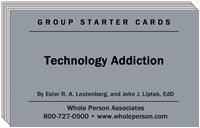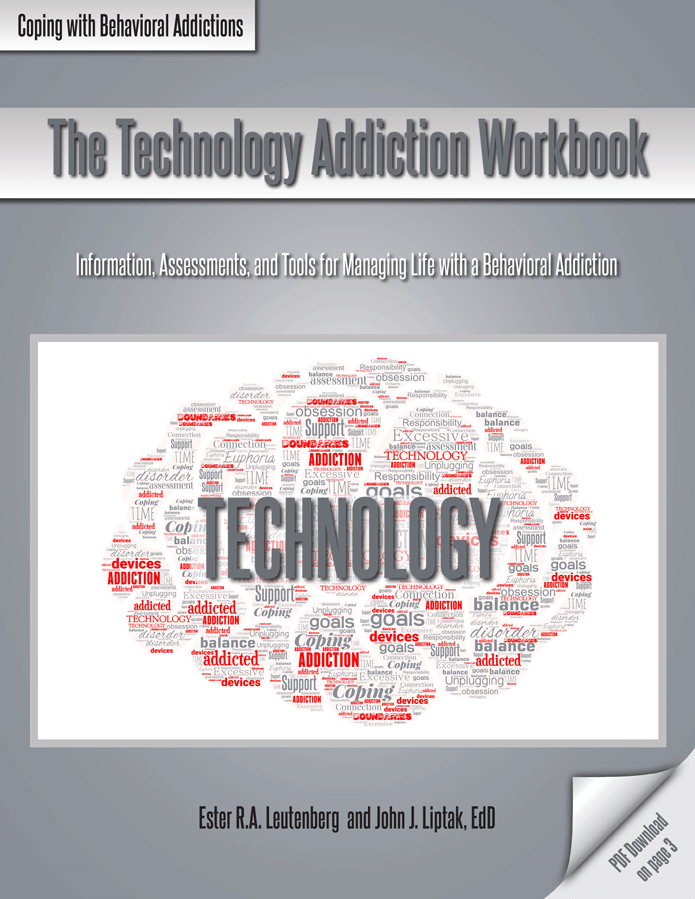Technology Addiction
The Technology Addiction Workbook provides helping professionals with cognitive and behavioral assessments, tools, and exercises that can be utilized to treat the root psychological causes of technology addiction. It is designed to help people identify and change unhealthy thoughts and behaviors that may have led to technology addiction. The activities in this workbook can help participants identify the triggers that can lead to the overuse of technology and teach them ways to overcome and manage those triggers.
Since the emergence of the internet and smartphones, an increasing number of people are struggling with an addiction to some form of technology. Constantly being plugged into a smartphone, social media, or other devices and being on the internet leads to fear of not hearing about activities and being left out of news and information. Given the neurological changes that occur while being online, more and more people are at risk of developing a technology addiction.
The Technology Addiction Workbook will help participants to achieve the following:
- Recognize that they are experiencing an addiction problem.
- Reflect upon the behaviors that are part of and arose from the addiction.
- Build self-esteem in positive capabilities outside the use of technology.
- Understand the triggers for preoccupation with various aspects of technology.
- Develop greater self-acceptance and the ability to change ineffective behaviors.
- Understand recurring patterns that indicate a technology addiction.
- Learn ways to live a new life without obsessing over technology.
The Technology Addiction Workbook is a practical tool for teachers, counselors, and helping professionals in their work with people suffering from behavioral addictions. Depending on the role of the person using this workbook and the specific group’s or individual’s needs, the modules can be used individually or as part of an integrated curriculum. The facilitator can administer an activity with a group or individual or use multiple assessments in a workshop.
The Technology Addiction Workbook contains five modules of activity-based handouts that will help participants learn more about themselves and their technology addiction. These modules serve as avenues for self-reflection and group experiences revolving around topics of importance in the participants’ lives.
The activities in this workbook are user-friendly and varied to provide a comprehensive way of analyzing, strengthening, and developing characteristics, skills, and attitudes for overcoming an addiction to technology.
The activities and handouts in this workbook are reproducible. Minor revisions to suit client or group needs are permitted, but the copyright statement must be retained.
Module 1: Cultivating Awareness
This module helps participants explore how their overuse (often addiction) of technology affects their lives, examine problems caused by the overuse of technology, learn ways to become more mindful, become aware of the physical symptoms of technology overuse, and recognize and effectively deal with technology triggers.
Module 2: Digital Well-Being
This module helps participants explore how overuse and overdependence on technology can interfere with their general well-being. They will examine how the overuse of technology can be destructive in various ways, and they will learn how to make lifestyle changes to alter the ways and the amount of time they spend using technology.
Module 3: Unplugging
This module helps participants examine how much they are overusing technology, the intensity of their addiction, and ways to unplug and start reconnecting with themselves more holistically. They will explore what they miss because they are overusing technology and learn ways to unplug.
Module 4: Finding Balance
This module helps participants focus on how much time they spend with the major technology types. They will examine ways to get the same benefits from engaging in other activities, determine methods for balancing technology and relationships, explore how to balance technology and work, and define ways to engage other people in their lives as they begin disconnecting from their overuse of technology.
Module 5: Technology Overuse
This module helps participants discover how they may be overusing technology to mask challenges and escape the reality of their problems. They will find ways of coping with stress other than using technology, think more clearly, connect with people offline, and engage in non-technology leisure activities.
 Technology Addiction Card Deck
Technology Addiction Card Deck
Using the Discussion Starter Card Deck will break the ice, encourage openness, and help introduce a specific subject. Activity handouts included in these workbooks are reflective, easy-to-use exercises, presented in a variety of formats to accommodate multiple intelligences and different learning styles. Each question corresponds to a page in the workbook.


